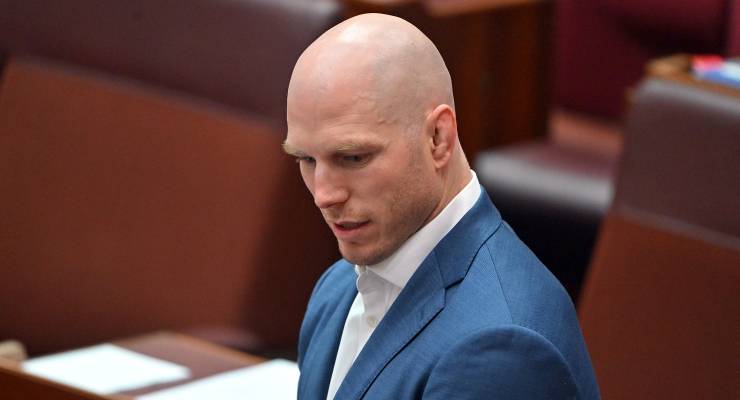
Australia’s biggest companies like to talk about their support for climate action, but often fail to follow through on the rhetoric, a new study has found.
Fossil fuel giants like Santos and Origin Energy have failed to back government initiatives that would help achieve the goals of the 2015 Paris Agreement, even though they’ve appeared supportive of it in their own corporate communications, according to non-profit think tank InfluenceMap.
“We’re seeing a lot of these companies come out in support for net zero by 2050, but then when we look into their actual engagement on policies that are likely to achieve these goals, they’re not so supportive,” report author Jack Herring told Crikey.
The report looked at the climate policy engagement of the 70 largest companies in Australia and the 25 most influential lobby groups, and found that 87% of them issued “top-line support” for climate action during the first year of the Albanese government.
But only one in 10 were supportive of initiatives to reduce emissions when engaging in consultations on bills and government strategies.
Some examples in the report included Glencore, which fought the government’s proposed design of the safeguard mechanism; Origin Energy, which opposed mandatory national energy efficiency targets in the National Energy Performance Strategy; and the Minerals Council of Australia, which opposed introducing a climate trigger in the Environment Protection and Biodiversity Conservation Act.
The report included comments from independent ACT Senator David Pocock, who said the corporations were “putting the future of the people and places we love at risk”.
“We all know there is a big mismatch between what companies say and what they’re actually doing on climate. We see companies like Santos and Woodside claiming they’re aiming for net-zero emissions while continuing to progress new fossil fuel developments,” Pocock was quoted as saying. “These two things can’t be true.”








Fossil fuel companies have no intention of supporting or working towards net-zero. Obviously, their core business is making money from, um, fossil fuels, so no point blaming them. Unfortunately, we have politicians running the country who either have vested interests in keeping things the way they are (cue the revolving doors between mining/fossil fuel companies, and politicians and associated hangers-on).
If we continue electing the same duopoly of LibLab, while ever those cosy relationships remain, nothing will ever change.
Fossil fuel companies are moving into renewable energy, but that of course doesn’t stop them digging up or burning fossil fuels. I mean, when the government will give you subsidies to build a wind farm and still let you profit from your fossil fuel operations, you’d have to be negligent (in a “vulnerable to being sued by shareholders” sense) to pass up all that money.
It’s amazing how predictable the outcomes of a lack of regulation can be. To everybody except a politician, it seems.
Same US linked fossil fuel players as the UK etc. who influence policy especially the right, but locally bipartisan (immigration too); see Tufton St. London (Atlas or Koch Network) Net Zero Watch and Global Warming Policy Foundation of which former Oz PM Tony Abbott is a part of doing PR and lobbying to/with RW MSM, influencers and Tories.
It’s all well and good that most Australian industry would be supportive of government action on fossil fuels. But when there is no government roadmap towards zero fossil fuels, it is hypocritical to blame industry for failing to make token reductions. That roadmap should consist of milestones when this and that industry has fully zeroised its use of fossil fuel. The operative word is “zero”, not “reduce”. In the years ahead as governments fail to make real progress towards zero fossils, it is inevitable that environmentalists hear any promise to “reduce” as a smokescreen for doing nothing at all.
Absolutely. ALP policy might have some “targets” (or soft aspirations) ending at net-zero, but ALP action seems to be “spend money on renewables while letting fossil fuel extraction continue”. They’ll build renewable energy sources, but they just don’t seem to want to say “no” when someone asks for a new coal mine.
Unfortunately for us, a gigatonne of carbon dioxide plus a heap of taxpayer-funded renewables still leaves us with a gigatonne of carbon dioxide.
20 odd years ago I spoke to a rep from a 2 letter petroleum company whose current job was to preach the benefits of fossil fuel to school children. The company had made their own road map, to hell. Oh yeh, the change of symbol meant nothing. All part of their road map.
So no, it is not hypocritical to blame industry. They never had any intention to stop until every last gram of fossil fuels was consumed.
All governments gave up on producing a road map in the 90’s. Australia is just the worst of the lot. If only we had 30 David Pococks.
All large corporations have PR staff who are paid to use words like “renewable” and “sustainable”. PR staff don’t, of course, create policy. They’re there to distract us from those corporate policies.
What’s new? The energy and energy reliant companies whisper that they love us and that they’ll be faithful forever, but they leave after they’ve had their wicked way, and all we’re left with is a pain in the nether regions and a feeling of disillusionment.
Climate change action costs money and productivity for business so never sees it as a core interest and lobbies governments hard to restrict or water down positive climate related initiatives. Initiatives are introduced with modest targets. governments need to be stronger and resist pressure which is hard to do in a democracy controlled by elite interest which have the money to influence policy. The only countries that appear to take climate action seriously are China and several small European states like Norway and Iceland for example. Though China being the world’s industrial powerhouse has a long way to go and still highly dependent on fossil fuels has a clear goal of ridding itself of all fossil fuels and has the authority to make big business respond accordingly. Over 60% of all world renewable energy installed last year was in China. Just over 50% of all its electricity generated there is now renewable which is 2 years ahead of target. It also reached peak carbon emission last year 5 years ahead of schedule. Around 40% of all cars sold there are now pure EV’s. In Norway it’s over 80%. Government need to develop some balls.